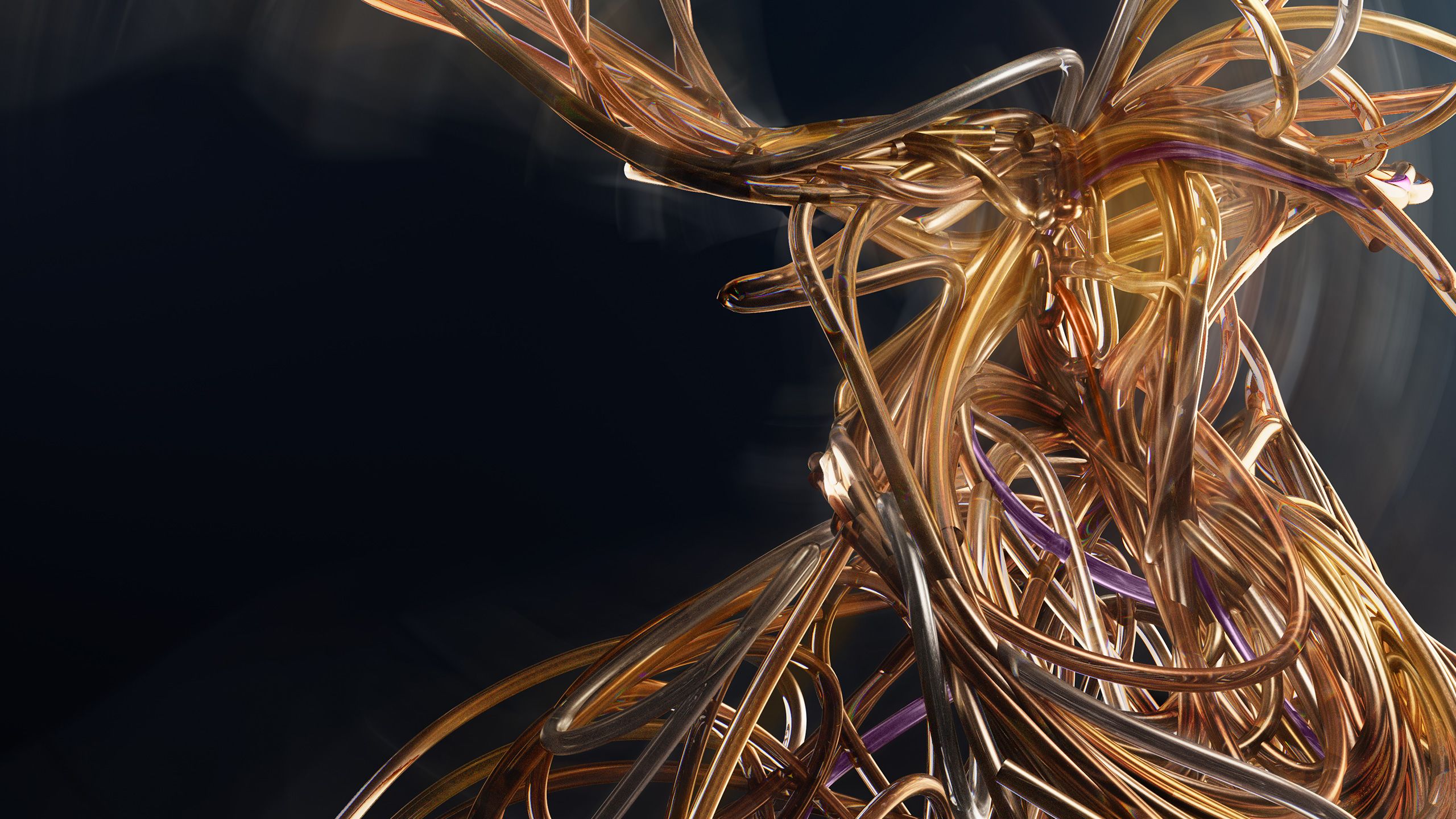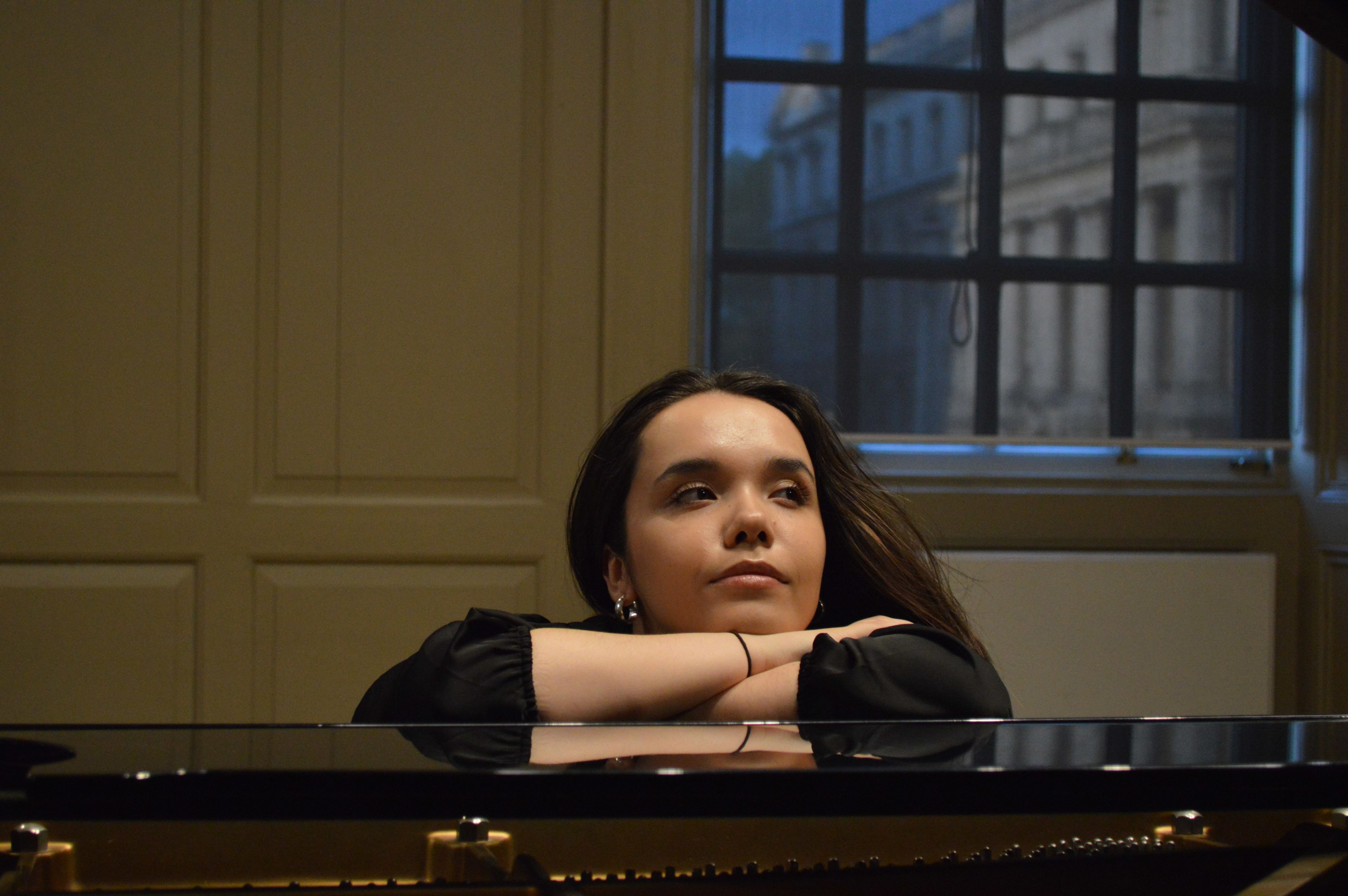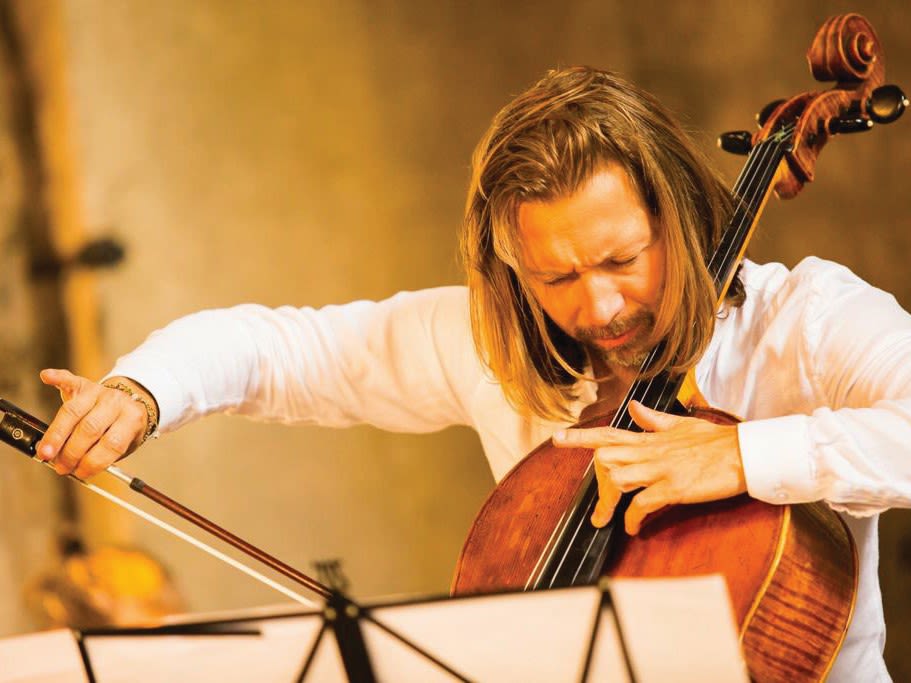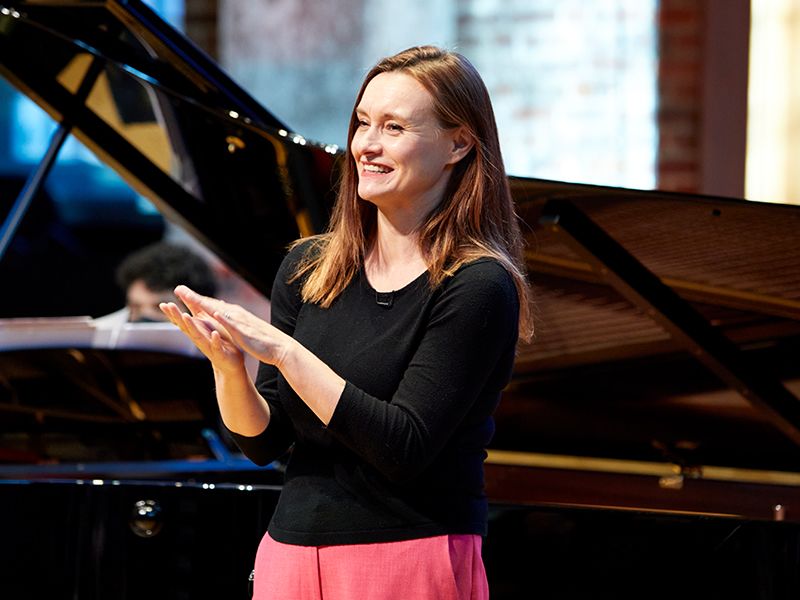LSO Discovery
Free Friday Lunchtime Concert

TODAY'S CONCERT
Edward Elgar Chanson de matin
Alexander Glazunov Chant du ménestrel
Nadia Boulanger Modéré from Three pieces for cello and piano
Serge Rachmaninoff Vocalise
Manuel de Falla Excerpts from ‘Seven Spanish Folksongs’
David Cohen cello
Alina Pritulenko piano
Rachel Leach presenter
USING YOUR DIGITAL PROGRAMME
- Connect to the free hawksmoor WiFi network.
- Navigate using the menu icon (≡) at the top of the screen.
- Please set your phone to silent and don't use other apps during the music.
Edward Elgar (1857 to 1934)
Chanson de matin
✒️ 1899 | ⏰4 minutes

We often think of Elgar as the quintessentially English composer writing solid Romantic Victorian music at a time when the rest of the musical world was in turmoil. We now know however that Elgar was in just as much personal turmoil as everybody else. From a lower-middle class family of amateur musicians, Elgar was self-taught, Roman Catholic and for much of his early adult life felt that his face just didn’t fit the mould of ‘great British classical composer’. Chanson du matin (Morning Song) was written before his first major success (Enigma Variations) but just after his marriage so Elgar was suffering from conflicting emotions. His personal life was happy but his work still unacknowledged and overlooked. Perhaps mirroring this, he also wrote a darker companion piece Chanson de nuit. Both are now very famous and beloved.
Note by Rachel Leach
Alexander Glazunov (1865 to 1936)
Chant du ménestrel
✒️ 1900 | ⏰5 minutes

For a short period after Pyotr Ilyich Tchaikovsky’s death and before the rise of Igor Stravinsky and Sergei Prokofiev, Alexander Glazunov was the ‘best composer in Russia’. Sadly, by sticking to an overly Romantic sound he was soon after thought of as very old-fashioned, and when he died aged 70 critics joked that they thought he had died years before. To modern ears, his music is no longer old-fashioned: it is luscious and romantic. Chant du ménestrel was written in 1900 for the solo cellist of the Tsar. A ménestrel is similar to a French troubadour. They were poet-musicians who travelled the countryside singing of courtly love.
Note by Rachel Leach
Nadia Boulanger (1887 to 1979)
Three pieces for cello and piano
✒️ 1911 | ⏰3 minutes

1 Modéré
Nadia Boulanger is now most famous for teaching almost every important male American composer of the first half of the 20th century. But before she began teaching her daily lessons at the French Music School for Americans, she was a composition student at the Paris Conservatoire. Here she studied under Gabriel Fauré and was desperate to be the first woman to win the prestigious Prix de Rome. Her efforts were in vain. Her younger sister actually achieved the honour in 1913 and soon after Nadia gave up composing forever stating ‘I wrote useless music’. Three pieces for cello from 1914 prove otherwise. Modéré is dreamy, floaty, and reminiscent of Debussy.
Note by Rachel Leach
Serge Rachmaninoff (1873 to 1943)
Vocalise
✒️ 1915 | ⏰6 minutes

Serge Rachmaninoff is most closely associated with large scale, passionate symphonies and terrifyingly difficult music for the piano. Surprisingly then, one of his most famous pieces started life as a song. Vocalise was actually the final song in a collection for voice and piano. It was written for soprano and was to be sung on one vowel of the performer’s choosing; now of course, it exists in many different versions. An unsettled pulsing piano accompaniment, uneven phase lengths, a melody that constantly twists, and a tiny semiquaver ‘turn’ are what make this piece so arresting.
Note by Rachel Leach
Manuel de Falla (1876 to 1946)
Seven Spanish Folksongs
✒️ 1914 | ⏰5 minutes

5 Nana
6 Canción
3 Asturiana
7 Polo
Manuel de Falla (pronounced ‘fire’) was from a small town in south-western Spain and his first great success came with the one-act opera La vida breve (Life is short) written in 1905. This allowed him to move to Paris where he became part of an artistic community that included Claude Debussy, Maurice Ravel and Igor Stravinsky. Much of Falla’s output has a distinctly Spanish feel and particularly here in his Seven Spanish Folksongs. He takes the tunes and ‘reworks’ or ‘elevates’ them by adding original and clever accompaniments. They are amongst his most popular pieces today and are the ‘go to’ set of Spanish songs for sopranos. We will hear four today: 'Nana', a lullaby; 'Canción', a light-hearted dance; 'Asturiana', a sad lament; and 'Polo', which is violent and despairing.
Note by Rachel Leach
About the Artists

David Cohen
LSO Principal Cello
David Cohen has established a reputation as one of the most charismatic and exciting young cellists of today. He has been hailed by critics as 'Magnificent' (Gramophone), a musician who 'demonstrates total commitment, combining vitality with expressive feeling in the most spontaneous manner' (The Strad), and 'an individual, and an exceptionally gifted one,' (New York Stereo Review). David was appointed Principal Cello of the LSO in 2022.
David made his solo debut with the Belgian National Orchestra at the age of nine. He studied at the Yehudi Menuhin School and then at the Guildhall School of Music & Drama where he studied under Oleg Kogan. He has won more than 25 prizes in international cello competitions including the Gold Medal of the GSMD in London, the Geneva International Cello Competition, JS Bach International Competition and many others.
His international career as a soloist soon flourished with invitations from Saint Petersburg Philharmonic Orchestra, BBC Symphony Orchestra, London Soloists Chamber Orchestra, and many others.
In his remarkable musical journey, David has worked as a soloist with some of the most distinguished conductors in the industry such as Lord Menuhin, Mstislav Rostropovich, and Vladimir Ashkenazy, among others. His triumphant solo debut in Japan with the NHK Symphony Orchestra and Vladimir Ashkenazy performing Tchaikovsky’s Rococo Variations in June 2007, led him to be immediately re-invited for the 2009/10 season.
In March of 2001, David was appointed as the Principal Cello of the Philharmonia Orchestra, becoming the youngest Principal Cello in history. During the 2002/03 season, he was nominated as the ECHO Rising Star by the Royal Philharmonic Society of Belgium and the Concertgebouw.
David is the Artistic Director of the Melchoir Ensemble and the founder and Artistic Director of the chamber music festival, 'Les Sons Intensifs' in Lessines, Belgium. He is also a professor at the Conservatoire Royal de Musique de Mons in Belgium, a position he has held since 2000, and at Trinity Laban in London.
David plays on the 'Ex-Pergamenschikow cello', a magnificent Dominicus Montagnana circa 1735, thanks to the kindness and generosity of Mrs Pat Morton and the help of the Razumovsky Trust.
Alina Pritulenko
piano

Born in Tashkent, Uzbekistan, Alina Pritulenko began playing the piano at the age of five. She started performing from the age of seven at the numerous concerts and festivals. Alina actively took part in many masterclasses and soon became a laureate of international competitions such as Le Muse in Napoli, Italy and Iste’dod in Tashkent, Uzbekistan.
In 2008, Alina started her musical education at the Republican Specialized Academic Lyceum of Music, named after V. Uspensky. During eleven years of education, she studied with piano professors Irina Arustamova and Gulnora Umarova.
After graduating in 2019, she was invited to continue her education at the Trinity Laban Conservatoire of Music and Dance, and was awarded full scholarships from various sources such as Trinity College London, and the Bagri Foundation. She currently studies with Sergio De Simone, Martino Tirimo, and Mikhail Shilyaev. She has actively participated in a number of masterclasses led by players such as Joaquin Achucarro, Gabriel Kwok, and others. She also performs both solo and chamber music across venues in London such as the Old Royal Naval College Chapel, St Alfege Church, and many others.
She graduated from Trinity Laban with first class honours in July 2023 and continues to study there for her master’s degree, on another full scholarship kindly provided by Savile Club, Trinity College London, Ludwig Lebell, Beverley Creed and NOSWAD.

Rachel Leach
presenter
Rachel Leach was born in Sheffield. She studied composition, and her music has been recorded by NMC and published by Faber. She has won several awards including, with ETO, the RPS award for best education project 2009 for One Day, Two Dawns.
Rachel has worked within the education departments of most of the UK’s orchestras and opera companies. The majority of her work is for the London Symphony Orchestra and the London Philharmonic Orchestra. Rachel has written well over 20pieces for LSO Discovery and 15 community operas, including seven for ETO.
Increasingly in demand as a concert presenter, as well as presenting the LSO Discovery Free Friday Lunchtime Concert series, she regularly presents children’s concerts and pre-concert events for the LSO, LPO, Philharmonia Orchestra, Scottish Chamber Orchestra, Royal College of Music and Royal Northern Sinfonia.
Next Friday Lunchtime Concert

Friday 20 October 2023
Valerie Coleman Umoja
Sally Beamish The Naming of Birds
Jacques Ibert Trois pièces brèves
Haizea Quintet:
Samantha Rowe flute
Daisy Lihoreau oboe
Beñat Erro Diez clarinet
Izzy Cave bassoon
Niamh Rodgers horn
Rachel Leach presenter



